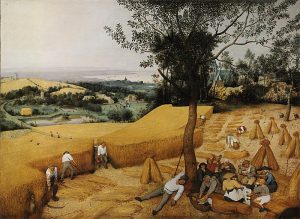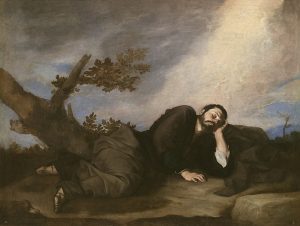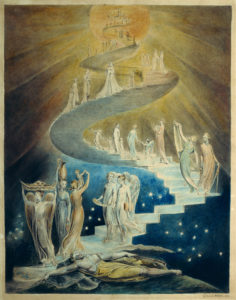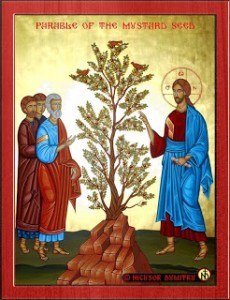Illuminations on the Lectionary readings for July 16, 2023 (Pentecost 7A)
First Reading (Track One): Genesis 25:19-34
Last week we heard how Rebekah became Isaac’s wife, “and he loved her.” But it soon turned out that this couple would have nearly as much trouble having children as Isaac’s parents Abraham and Sarah did:

The Harvesters (1565), oil painting on panel by Pieter Brueghel the Elder (1526/1530-1569). Metropolitan Museum of Art, New York City. (Click image to enlarge)
After marrying when Isaac was 40, they found that Rebekah was barren. Faithfully, Isaac prayed, and God answered his prayer with children; but Isaac was 60 by the time that happy event occurred with the birth of Esau and Jacob! As they grew, Jacob emerged as an inveterate trickster. In this Track One first reading we see Jacob trick his twin, in a hungry moment, into giving up his rights as firstborn in trade for a bit of bread and a pot of lentil stew.
First Reading (Track Two): Isaiah 55:10-13
The people’s exile in Babylon is coming to its end, but the long journey back to Jerusalem and the arduous work of restoring the city and rebuilding the Temple lies ahead. Having assured the people that God has forgiven the failure of justice and righteousness that earned them exile, the prophet now shows God as the giver of life and sustenance and all that is good. In these brief verses, these images of God giving seed to the sower and bread to the hungry ring in our ears as we hear Jesus’ parable of the sower in this week’s Gospel.
Psalm (Track One): Psalm 119:105-112
We hear parts of Psalm 119 a dozen times during the three-year cycle of Lectionary readings, so it will probably come as no surprise to hear that its 176 verses make it the longest of all the Psalms. All these verses comprise a long, loving celebration of the Torah, the first five books of the Bible. “Torah” is usually translated in this context as “law,” “ordinance” or “decree” throughout the psalms, but it might be better expressed as “teaching,” a point of view that reveals God’s loving desire for us to live in good relationship with God and each other. Following God’s teaching brings joy even in darkness and time of trouble, the Psalmist sings.
Psalm (Track Two): Psalm 65: (1-8), 9-14
This psalm of praise and thanksgiving beautifully reflects the Prophet Isaiah’s portrayal of God as the generous creator who made the world and all that is in it, and who provides bountiful water and grain, pastures and flocks. Perhaps originally sung as a harvest thanksgiving, it chants praise for the overflowing richness of God’s abundance and for the joy it provides to those who receive it. These praiseful verses prepare us for the Gospel’s hope for seeds that fall on good soil and yield a hundredfold.
Second Reading: Romans 8:1-11
The love of God’s law expressed in Torah and the Psalms would have had deep meaning for Paul, a devout Pharisee and Torah scholar who counted himself as righteous and blameless under the law. As a Jewish Christian evangelist, Paul evolved a new understanding that we see him working out in Romans: Christ’s resurrection has freed us from the law of sin and death, not the law of Torah but of the world. When we are in the world and living in its way of sinful flesh, Paul reasoned, we remain subject to sin and death. But when we turn and accept God’s Spirit through Jesus – when the Spirit dwells in us because Christ is in us – we gain life and peace.
Gospel: Matthew 13:1-9, 18-23
For the rest of the season after Pentecost, which continues through November, our Gospels will follow Matthew’s account of Jesus’s journey with the apostles from Galilee to Jerusalem. Many of those Gospels will take the form of parables, the colorful stories that Jesus uses to teach through metaphor. Sunday’s parable of the sower is the first parable in Matthew, and it is one of the few for which Jesus offers an explanation. But what does that explanation call us to do? Are we the soil, seeking to be good and receptive when we hear God’s word? Or are we to join the apostles in sowing the word of the Kingdom of God extravagantly, rejoicing when the harvest is bountiful?



